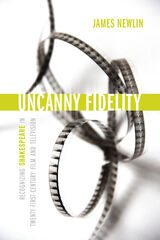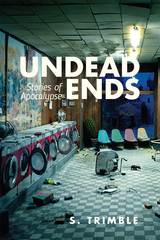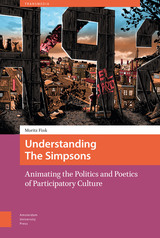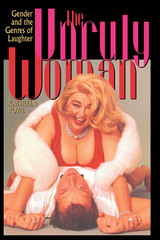6 start with U start with U

How the study of Shakespeare’s legacy, specifically in film and television, can radically challenge what we consider to be authentically Shakespearean
In the field of adaptation studies today, the idea of reading an adapted text as “faithful” or “unfaithful” to its original source strikes many scholars as too simplistic, too conservative, and too moralizing. In Uncanny Fidelity: Recognizing Shakespeare in Twenty-First Century Film and Television, James Newlin challenges these critical orthodoxies. Instead, recognizing how a film or television series closely recalls Shakespeare’s drama encourages an interrogation of what we consider to be “Shakespeare” in the first place.
Drawing upon Sigmund Freud’s model of the uncanny—the sudden sensation of peculiar, discomforting familiarity—this book focuses on films and television series that were not marketed as adaptations of Shakespeare. Yet these works unexpectedly invoke lost, even troubling aspects of Shakespeare’s original playtexts, their performance history, or their reception. Broadening the scope of fidelity readings beyond familiar concerns like plot and language, Newlin demonstrates how the study of Shakespeare’s afterlife can clarify both the historical context of his drama and its relevance for the current political moment. Engaging contemporary debates in literary and psychoanalytic theory, this book features provocative close readings of The Tempest, Othello, and The Winter’s Tale alongside recent films and television series, from art-house movies such as The Master and Manchester by the Sea to the cult favorites Brigsby Bear and Vice Principals. These works conjure widely overlooked qualities of Shakespeare’s drama by recalling the casting practices or the generic contexts of the early modern stage or by making a meaningful intervention in the plays’ critical reception. Closely examining these surprisingly faithful adaptations of Shakespeare’s drama helps us to articulate the original experience of the early modern stage and better consider its resonance in the present.
This book will benefit students and scholars of Shakespeare on film and psychoanalytic theory. Yet Uncanny Fidelity will also be of interest to scholars of performance history, source studies, and early modern discourses of race and gender—as well as anyone interested in the unexpected connections between canonical literature and contemporary culture. By examining adaptation as an instance of uncanny return, Newlin demonstrates how the study of Shakespeare’s afterlife can radically challenge what we consider to be authentically Shakespearean.


Webtoons—a form of comic that are typically published digitally in chapter form—are the latest manifestation of the Korean Wave of popular culture that has increasingly caught on across the globe, especially among youth. Originally distributed via the Internet, they are now increasingly distributed through smartphones to ravenous readers in Korea and around the world.
The rise of webtoons has fundamentally altered the Korean cultural market due to the growth of transmedia storytelling—the flow of a story from the original text to various other media platforms, such as films, television, and digital games—and the convergence of cultural content and digital technologies. Fans can enjoy this content anytime and anywhere, either purely as webtoons or as webtoon-based big-screen culture.
Understanding Korean Webtoon Culture analyzes webtoons through the lens of emerging digital cultures and discusses relevant cultural perspectives by combining two different, yet connected approaches, political economy and cultural studies. The book demonstrates the dynamics between structural forces and textual engagement in global media flows, and it illuminates snack-culture and binge-reading as two new forms of digital culture that webtoon platforms capitalize on to capture people’s shifting media consumption.

Webtoons—a form of comic that are typically published digitally in chapter form—are the latest manifestation of the Korean Wave of popular culture that has increasingly caught on across the globe, especially among youth. Originally distributed via the Internet, they are now increasingly distributed through smartphones to ravenous readers in Korea and around the world.
The rise of webtoons has fundamentally altered the Korean cultural market due to the growth of transmedia storytelling—the flow of a story from the original text to various other media platforms, such as films, television, and digital games—and the convergence of cultural content and digital technologies. Fans can enjoy this content anytime and anywhere, either purely as webtoons or as webtoon-based big-screen culture.
Understanding Korean Webtoon Culture analyzes webtoons through the lens of emerging digital cultures and discusses relevant cultural perspectives by combining two different, yet connected approaches, political economy and cultural studies. The book demonstrates the dynamics between structural forces and textual engagement in global media flows, and it illuminates snack-culture and binge-reading as two new forms of digital culture that webtoon platforms capitalize on to capture people’s shifting media consumption.


Unruly women have been making a spectacle of themselves in film and on television from Mae West to Roseanne Arnold. In this groundbreaking work, Kathleen Rowe explores how the unruly woman—often a voluptuous, noisy, joke-making rebel or "woman on top"—uses humor and excess to undermine patriarchal norms and authority.
At the heart of the book are detailed analyses of two highly successful unruly women—the comedian Roseanne Arnold and the Muppet Miss Piggy. Putting these two figures in a deeper cultural perspective, Rowe also examines the evolution of romantic film comedy from the classical Hollywood period to the present, showing how the comedic roles of actresses such as Katharine Hepburn, Barbara Stanwyck, and Marilyn Monroe offered an alternative, empowered image of women that differed sharply from the "suffering heroine" portrayed in classical melodramas.
READERS
Browse our collection.
PUBLISHERS
See BiblioVault's publisher services.
STUDENT SERVICES
Files for college accessibility offices.
UChicago Accessibility Resources
home | accessibility | search | about | contact us
BiblioVault ® 2001 - 2024
The University of Chicago Press









